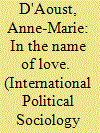|
|
|
Sort Order |
|
|
|
Items / Page
|
|
|
|
|
|
|
| Srl | Item |
| 1 |
ID:
124423


|
|
|
|
|
| Publication |
2013.
|
| Summary/Abstract |
The past 10 years have seen an increase in legislation pertaining to marriage migration in Europe. Such attention betrays various concerns and anxieties that intersect not only with issues of risk management, rights, and citizenship, but also with less tangible dimensions such as emotions, which become embedded in legal as well as in surveillance practices. Emotions such as love are integral to the institutions, procedures, analyses and reflections, calculation, and tactics that Foucault identified as part of governmental processes; the latter should not necessarily be equated with (and limited to) rationalized technocratic processes detached from emotional components. Technologies of love are central to the governmentality of marriage migration; as modes of subjectification and governing practice, they connect intimacy with citizenship. More than the manifestation of the rationalization of a specific emotion, technologies of love allow for an exploration of what an engagement with emotions such as love does to governmentality. Illustrations of the "attachment requirement" in Denmark, and the case of "Catgate" in Great Britain, show that technologies of love play a significant role in stirring and disciplining specific migration flows (what kind of marriage migrants the state welcomes or keeps at bay), but also in challenging, even if inadvertently, those policies and practices designed to gauge "true" relationships.
|
|
|
|
|
|
|
|
|
|
|
|
|
|
|
|
| 2 |
ID:
177723


|
|
|
|
|
| Summary/Abstract |
“The bedroom’s hierarchy,” once observed Cynthia Enloe, “is not unconnected to the hierarchies of the international coffee exchange or of the foreign ministry” (Enloe 2004, 31). With this statement, she asks us to not only question the constitution of spaces where politics are assumed to happen, but also our tendency to dissociate them. The Intimacies of Four Continents, The Carpertbaggers of Kabul, and Intimate Mobilities go well beyond confirming Enloe’s observation: they show us through which narratives, theoretical assumptions, and material processes hierarchies are constituted, connected, and challenged. Foregoing easy dichotomies between the personal and the political or between the local and the global, they contribute to a broader conversation inside the social sciences on the so-called affective and emotional turn, which questions the way scales, emotions, relationships, and world-making processes take place and (are made to) matter. They call upon us to seriously consider what the “Relations” in “international relations” entail, and what the political implications of who we are seen as connected to, or disconnected from, are. While not anchored in queer theory per se, all three volumes engage in a queering process of intimacy that estranges received stories about the rise of modern liberalism (Lowe 2015), the development projects taking place in post 2001 Afghanistan (Fluri and Lehr 2017), and the mobility-intimacy nexus (Groes and Fernandez 2018).
|
|
|
|
|
|
|
|
|
|
|
|
|
|
|
|
|
|
|
|
|